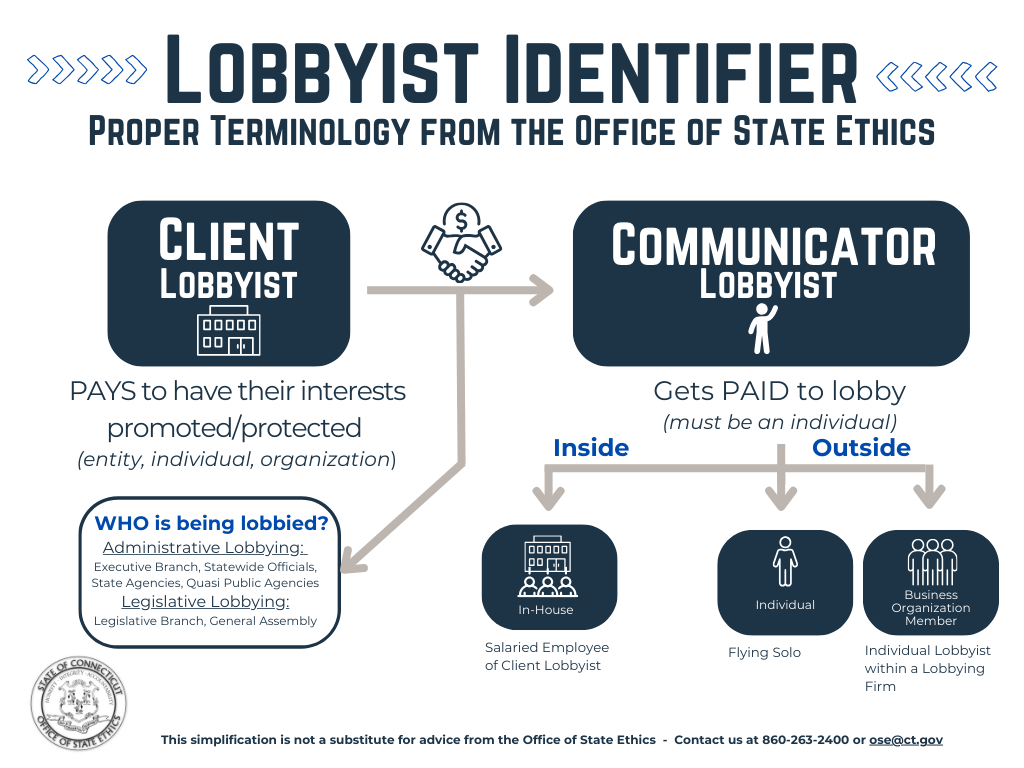Lobbyist Registration, Filing and Audit Information
What Type of Lobbyist Am I?
A Client Lobbyist is the party paying for lobbying services on its behalf. In other words, the client lobbyist is expending or agreeing to expend the threshold amount of $3,000 in a calendar year.
A Communicator Lobbyist receives payment and does the actual lobbying legwork (i.e., communicating). A Communicator Lobbyist receives or agrees to receive $3,000 for lobbying activities in a calendar year. Communicator Lobbyists can take different forms:
- Individual
- Member of a Business Organization (e.g., a firm or association that employs a number of communicator lobbyists)
- In-house Communicator (a lobbyist who is a salaried employee of a Client Lobbyist)

Lobbyist Filing System
Log-In to Lobbyist
Filing System
Use this link to create your 2025-2026 registration and to file disclosure reports.
New Client / Bus. Org. Account
Use this link only to create a NEW ACCOUNT in the system.
Search Lobbyist Database and Reports
"Lights on Lobbying" Newsletter
April 2025 "Lights on Lobbying" Newsletter
Lobbyist Filing Calendars and Information
Financial Disclosure Filings on ETH-2D form are due quarterly. (see dates below)
ALSO, additional financial disclosure filings are due monthly while CT General Assembly is in regular session AND when the client registrant expends or agrees to expend $100+ for legislative lobbying.
|
2025 Client Lobbyist Quarterly Reporting Schedule |
Due Dates |
|
January 1–March 31, 2025 |
April 10, 2025 |
|
April 1 – June 30, 2025 |
July 10, 2025 |
|
July 1 – December 31, 2025 |
January 10, 2026 |
|
2025 Client Lobbyist Monthly Reporting Schedule (Long Session) |
Due Dates |
|
January 1 – January 31 |
February 10, 2025 |
|
February 1 – February 28 |
March 10, 2025 |
|
March 1 – March 31 1st Quarter Report |
April 10, 2025 |
|
April 1 – April 30 |
May 10, 2025 |
|
May 1 – May 31 |
June10, 2025 |
|
June 1 – June 30 2nd Quarter Report |
July 10, 2025 |
Print and Post - 2025 Lobbyist Filing Calendar
**Register with the Office of State Ethics on or before January 15 or prior to the commencement of lobbying.
***NOTE: Client lobbyists must file all quarterly reports, even if they made no lobbying expenditures during the reporting period.
If you require assistance, please e-mail: lobbyist.ose@ct.gov
Lobbyist Audit Corner
The Office of State Ethics is required to annually audit registration and disclosure reports of lobbyists to promote accountability for lobbyists’ activities. Our random selection of lobbyists is performed periodically by our staff in a public meeting under the observation of the Citizen’s Ethics Advisory Board.
The primary purpose of the audit is to determine whether information reported to the Office of State Ethics is timely, accurate and complete.
Audit Benefits:
- Ensure compliance with the Code of Ethics
- Identify potential risks and liabilities and to improve legal compliance
- Provide a systemic evaluation to determine effectiveness and to improve organizational performance
- Serve the public interest and confidence in our government
The Office of State Ethics recommends that lobbyists maintain their documentation in accordance with our Procedures Manual for Lobbyist Recordkeeping and Audit.
- Documents Lobbyists Must Maintain for Audit
- Lobbyist Record Keeping Manual
- Thirty Client Lobbyists Selected for 2025 Audit
- Thirty Client Lobbyists Selected for 2024 Audit
- Thirty Client Lobbyists Selected for 2023 Audit
- Ten Client Lobbyists Selected for 2022 Audit
- Ten Client Lobbyists Selected for 2021 Audit
- Ten Client Lobbyists Selected for 2020 Audit
- Ten Client Lobbyists Selected for 2019 Audit
Education and Training:
-Training Presentations-
2025 Pre-Legislative Session Lobbyist Ethics Training
-Guides to the Code of Ethics for Lobbyists-
- Client Lobbyist Guide to the Code of Ethics
(Rev. 11/2021) - Communicator Lobbyist Guide to the Code of Ethics
(Rev. 11/2021) - Lobbyist Record Keeping Manual
Quick Links
- 2025-26 Lobbyist Registration and Audit Information
- The Difference Between Necessary Expenses and Gifts to the State
- 10 Day Letter to a Public Official or State Employee (to be used by registered lobbyists)
Lobbyist Audit Staff
Carol Langevin Associate Accounts Examiner 860-263-2394

